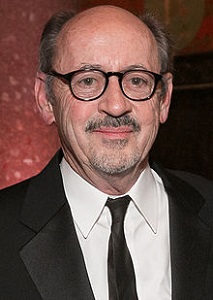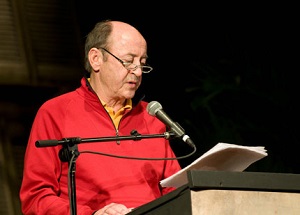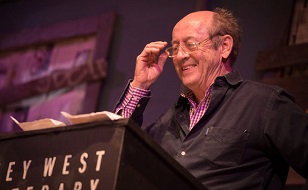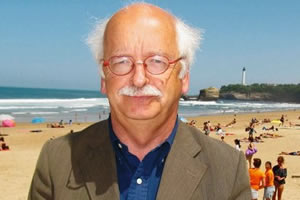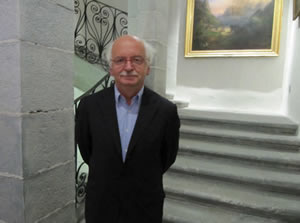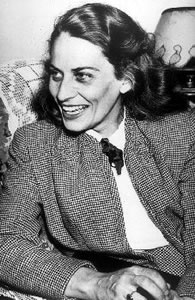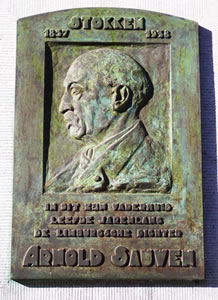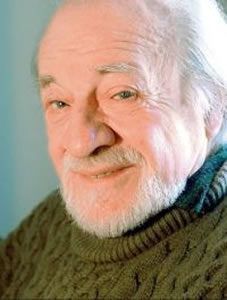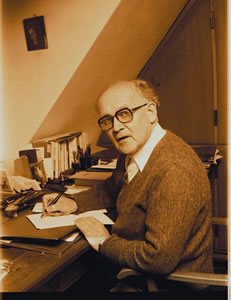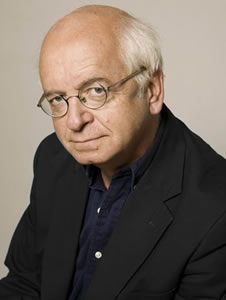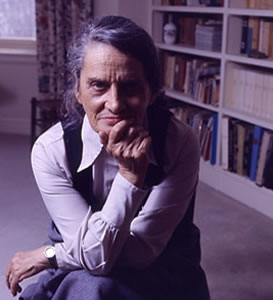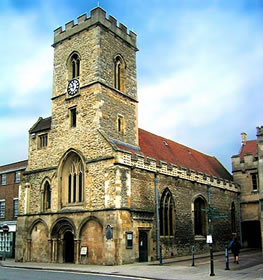De Amerikaanse dichter en schrijver Billy Collins werd geboren in New York op 22 maart 1941. Zie ook alle tags voor Billy Collins op dit blog.
Morning
Why do we bother with the rest of the day,
the swale of the afternoon,
the sudden dip into evening,
then night with his notorious perfumes,
his many-pointed stars?
This is the best—
throwing off the light covers,
feet on the cold floor,
and buzzing around the house on espresso—
maybe a splash of water on the face,
a palmful of vitamins—
but mostly buzzing around the house on espresso,
dictionary and atlas open on the rug,
the typewriter waiting for the key of the head,
a cello on the radio,
and, if necessary, the windows—
trees fifty, a hundred years old
out there,
heavy clouds on the way
and the lawn steaming like a horse
in the early morning.
Silence
There is the sudden silence of the crowd
above a player not moving on the field,
and the silence of the orchid.
The silence of the falling vase
before it strikes the floor,
the silence of the belt when it is not striking the child.
The stillness of the cup and the water in it,
the silence of the moon
and the quiet of the day far from the roar of the sun.
The silence when I hold you to my chest,
the silence of the window above us,
and the silence when you rise and turn away.
And there is the silence of this morning
which I have broken with my pen,
a silence that had piled up all night
like snow falling in the darkness of the house—
the silence before I wrote a word
and the poorer silence now.
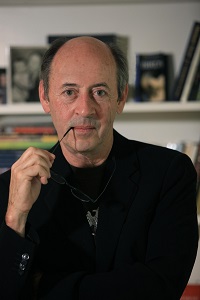
Billy Collins (New York, 22 maart 1941)
De Nederlandse schrijver en vertaler Theo Kars werd geboren in Rotterdam op 22 maart 1940. Zie ook alle tags voor Theo Kars op dit blog.
Uit: Memoires van een slecht mens
“Het eerste voorval dat ik mij uit mijn prille kindertijd herinner, staat onwaarschijnlijk scherp in mijn geheugen gegrift. Ik moet toen niet veel ouder dan drie jaar zijn geweest, want mijn grootvader hield mij op zijn arm. Wij stonden in de deuropening van de bijkeuken van het huis van mijn ouders. Mijn grootvader had een grijze gleufhoed op. Opeens, in een opwelling van baldadigheid, sloeg ik de hoed van zijn hoofd. Ik deed dit niet om hem te plagen, maar uitsluitend voor mijn eigen vermaak, en schaterde het uit toen de hoed door de lucht vloog en een paar meter verder op de betonnen vloer belandde. Ik was verrast door de geërgerde reactie van mijn hevig geschrokken grootvader, wiens keurige, door een middenscheiding in twee symmetrische helften verdeelde dunne, grijze haardos opeens tot enkele slordige slierten was herleid. Hij zette mij op de grond en sprak mij daarna op boze toon toe, daarin bijgevallen door mijn moeder, die was toegesneld. Ik weet niet meer wat zij zeiden, maar nog wel dat ik begreep dat ik onnadenkend had gehandeld en onbedoeld iemand op wie ik dol was een onaangename sensatie had bezorgd. Dit voorval is mij vermoedelijk zo duidelijk bijgebleven omdat ik mij toen voor het eerst bewust werd van mijn verantwoordelijkheid voor mijn doen en laten.
Mijn ouders, die beiden uit Rotterdam afkomstig waren, woonden in Bergschenhoek op Bergweg nr. 1, het eerste huis na de stadsgrens bij Hillegersberg. Deze grens liep enkele honderden meters midden over de Bergweg, waardoor de huizen aan de ene zijde van de weg nog tot de gemeente Rotterdam behoorden en die aan de overzijde deel uitmaakten van Bergschenhoek. Deze topografische eigenaardigheid zou niet vermeldenswaard zijn als zij aan het eind van de oorlog niet tot een wrange situatie had geleid die grote verontwaardiging teweegbracht in mijn ouderlijk huis. Toen de geallieerden in het voorjaar van 1945 voedsel dropten voor de hongerige bevolking van Rotterdam, werd dit uitsluitend onder de hongerige burgers van deze stad verspreid. Als gevolg daarvan kregen de bewoners van de huizen aan de Rotterdamse zijde van de Bergweg extra voedsel, maar werd aan de niet minder hongerige bewoners aan de overzijde niets uitgereikt. Iedereen in mijn omgeving was erg verontwaardigd hierover, vooral mijn grootvader, die in die tijd met zijn vrouw bij mijn ouders woonde, en verzot was op eten. Mijn vader placht minachtend over hem te zeggen dat hij ‘van zijn buik zijn God maakte’. Ik herinner mij dat ik mij verbaasde over de algemene verontwaardiging, en dacht: het is vervelend dat Rotterdam net bij ons huis ophoudt, maar dat is niemands schuld. Op wie is iedereen nu zo kwaad?”
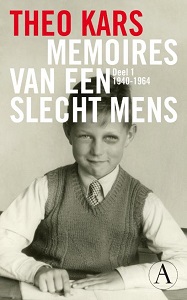
Theo Kars (22 maart 1940 – 10 november 2015)
Cover
De Zwitserse schrijfster Eveline Hasler werd geboren in Glarus op 22 maart 1933. Zie ook alle tags voor Eveline Hasler op dit blog.
Uit: Die Wachsflügelfrau
„Da steht schon wieder eine der Wärterinnen hinter ihr. Die Hügin hat eine Art, geräuschlos in Stoffschuhen sich hin-terrücks zu nähern. Neugierig ist die, wittert mit der flei-schigen Nase, beschnuppert die Dinge, läßt unter der falti-gen Oberlippe die Zähne sehen. Nein. Nicht lesen. Emily zieht die Schulter hoch wie ein Schulkind, das sich gegen Abschreiben schützt. Die Hügin kann unter dem abgewinkelten Arm Emilys Namenszug sehen: Dr. Emily Kempin. Schwungvoll, diese Unterschrift! lacht die Hügin. -Doktor. — klingt gut, was! Die Schneidezähne sind immer noch zu sehen, obwohl die Hügin aufgehört hat zu lachen. Emily richtet sich auf, dreht abrupt den Kopf: Ich habe den Doktortitel verdient. Kein Doktor Marriage. Schon gut, Frau Kempin. Frau Doktor Kempin. Nicht einmal die Rosa Clarissa, die ihr von den Wärte-rinnen noch die liebste ist, wird den Brief zu sehen be-kommen. Nur Dr. Wolff. Direktor Mille wird ihn natür-lich lesen, er, der alles, was hier geschieht, überblickt. Fast alles. Bevor sie zum Pavillon zurück muß, händigt ihr die Hü-gin die zerlesenen Zeitungen aus. Auch die Schere wieder? Ja, die Schere. Dr. Wolff hat Emily eine der sonst streng gehüteten Scheren zugestanden, zweimal die Woche von drei bis fünf, speziell für ihre •Weltordnungen•. Um fünf sind alle geliehenen Gegenstände abzuliefern, das ist Vor-schrift. Aufrecht im Bett sitzend, schneidet sie ins Zeitungspa-pier. Die Spitze der Schere fährt Figuren aus dem Reklameteil entlang: Umrisse einer Frau im Pelzmantel, die Pelzmütze wie ein Schiff auf den Locken. Die Schere frißt sich weiter. Ein Mann mit Zylinder, der ausgestreckte linke Arm mit dem weißen Handschuh zeigt auf einen patentierten eins a Aktenkoffer. Behutsam, nur behutsam, damit das zerknitterte Papier nicht reißt. Um deutlich zu sehen, muß sieden Kopf weit hinunterbeugen, längst bräuchte sie eine Lesebrille, es wird das erste sein, was sie sich nach der Entlassung vom Lohn des Pfarrers leistet. Nun kommt das Zerschneiden der Figuren: säuberlich den Kopf mit dem lächelnden Mund abtrennen, den linken Arm mit dem Pelzmuff. Schweißtropfen sammeln sich über ihrcn Brauen. Ein Männerbein in gestreifter Hose, eine Damennase, ein Männerfuß im Lackschuh liegen auf ihrer Bettdecke. Nun alles in die Schachteln geordnet: in eine Frauen-schachtel, in eine Männerschachtel.“
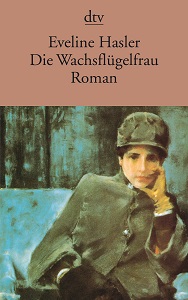
Eveline Hasler (Glarus, 22 maart 1933)
Cover
De Franse schrijver Érik Orsenna werd geboren in Parijs op 22 maart 1947 als Érik Arnoult. Zie ook alle tags voor Erik Orsenna op dit blog.
Uit: La Fontaine
« Le père, qu’en ce jour il faut présumer heureux, se nomme Charles de La Fontaine. Le petit Jean est son premier enfant. Il est baptisé en l’église Saint-Crespin, lequel est patron des savetiers. Chez les La Fontaine, on est de bourgeoisie récente, à peine quatre générations, enrichies dans le commerce et notamment celui du drap. Ce début de fortune a permis au grand-père d’acquérir une charge, celle de « maître des Eaux et Forêts ». À ce titre, il surveille et contrôle un territoire à lui confié par le seigneur du lieu. Au fil du temps, les La Fontaine ont acheté des terres. Ils tirent de leurs fermes l’essentiel de leurs revenus. Une charge et des fermes : on n’est pas encore tout à fait noble, mais on s’en rapproche. Encore un effort, La Fontaine !
La mère, prénommée Françoise, mais d’abord née Pidoux, éveille plus notre intérêt. Dès le XIIIe siècle, sa famille n’a cessé d’occuper les plus hautes fonctions : banquiers de princes, évêques, prévôts des marchands… Un Pidoux fut seigneur de Chaillot, un autre liquidateur des biens des Templiers. Habitant Paris, mais chassés par la guerre de Cent Ans, ils s’enfuient vers Poitiers où ils s’installent. Et, de mariage en mariage, ils continuent de tisser des liens utiles. On trouve des Pidoux partout : l’un est beau-frère du cardinal de Richelieu ; un autre, parent de Bossuet ; une autre encore, cousine de Racine… N’oublions pas un Pidoux médecin du roi Henri III.
Les Pidoux ne sont pas que sérieux. La passion peut parfois les conduire à toutes les audaces et tous les sacrifices. Le jeune Loys, un des frères de Françoise, donc l’oncle direct de notre poète, achève ses études de médecine. Il a vingt-cinq ans. Un beau jour, il rencontre une quasi vieille (trente ans), mais encore fille, Isabelle de Richelieu. Coup de foudre. Les familles s’opposant au mariage, Loys enlève Isabelle. Ils vivront à Dole, capitale d’une Franche-Comté pas encore française. Toujours fous d’amour, mais désargentés : la parentèle a profité de leur fuite pour faire main basse sur leurs biens.
Un autre Pidoux a connu la gloire pour une raison qui tient à l’hydrologie en même temps qu’à l’hygiène. Il se passionne pour les eaux thermales, comparant sans fin les vertus d’une cure à Pougues, à Spa et à Bourbon-l’Archambault.”
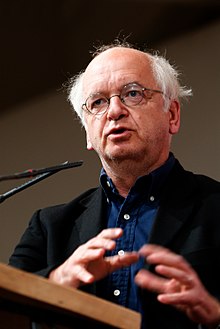
Érik Orsenna (Parijs, 22 maart 1947)
De Vlaamse dichter en schrijver Arnold Sauwen werd geboren te Stokkem op 22 maart 1857. Zie ook alle tags voor Arnold Sauwen op dit blog.
Landschap
Op Lanklaars hoogsten heuvel blijf ik staan,
en laat mijn blikken in het ronde weiden.
Een reuzenslange schijnt de zandge baan,
die kronkelt door de stille, bruine heide.
Het verre West, in bloedig rood gehuld,
Zie ik door ’t kaalgeschudde boschje blinken;
de laatste glans der najaarszon verguldt
de kruin der boomen, in het nederzinken.
Een schaarsche vogelzang breekt soms de stilt;
De krekel sjirpt, in ’t heidekruid verloren;
Somwijlen klinkt een schot, dat ’t bosch doortrilt,
en ’t schallend toeten van een jagershoren.
Ginds, achter eik en kalen beukentop,
waardoor de koele najaarswinden suizen,
heft Stockheims kerk haar spitsen toren op,
hoog boven markt en blanke visschershuizen.
Stil wenkt mij, in het diepe Mazedal
het dorp, getuige mijner kinderjaren;
en de oude linde, naast den breeden wal,
lacht als een droom, sinds lang reeds heengevaren.
En blijde groet ik ’t dak van meengen vrind,
het torenhaantje, dat in ’t zonlicht fonkelt,
en Limburgs stroom, die, als een zilvren lint,
langs akkerland en vruchtbre weiden kronkelt.
Arnold Sauwen (22 maart 1857 – 11 mei 1938)
Gedenkplaat
De Duitse dichter Wolfgang Bächler (een pseudoniem van Wolfgang Born) werd geboren op 22 maart 1925 in Augsburg. Zie ook alle tags voor Wolfgang Bächler op dit blog.
Stadtbesetzung
Schwarze Wälder belagern die Stadt, haben sie lautlos umzingelt. Längst haben sie Vorposten an die Einfallstraßen gestellt, Spähtrupps, Vorhuten, Fünfte Kolonnen bis in den Stadtkern geschickt. Jetzt dringen sie nachts in die Vororte ein, schlagen sie Breschen in Villenviertel, stoßen an die Ufer des Flusses, die Böschungen der Kanäle vor und säumen alle Gewässer ein.
Pappelkolonnen sperren die Straßen ab, gliedern die Alleebäume ein, schließen zu dichteren Reihen auf, marschieren im Gleichschritt weiter. Tannen und Eschen befreien Gefangene in den Gärten und Parks, Friedhöfen und Hinterhöfen. Eichen und Buchen besetzen die Kreuzungen, Knotenpunkte, die großen Plätze, verbrüdern, verschwistern sich mit den Ulmen, Linden, Kastanienbäumen, sprengen die Ketten parkender Autos, drängen die Baumaschinen, Bauzäune, Grundmauern, Gerüste, Geländer zurück, schlagen Wurzeln in Gruben und Gräben.
Fichten umstellen die Amtsgebäude, das Rathaus, den Rundfunk, den Bahnhof, die Polizeiinspektionen, Gerichte, Gefängnis, das Arbeitsund das Finanzamt. Die Pappelfront hat die Kasernen erreicht, verteilt sich um die Gebäude. Ahornbäume füllen die Lücken, schreiten durchs Tor in den Hof. Machtlos klettern die Wachen mit ihren Gewehren die Äste hinauf in die Kronen, sehen vor lauter Bäumen die Stadt nicht mehr.
Geräuschlos, kampflos, ohne Verluste haben die Wälder die Stadt besetzt, erobern sie Heimatboden zurück, besiegen sie Steine, Stahl und Beton, verdrängen Verdrängte ihre Verdränger.
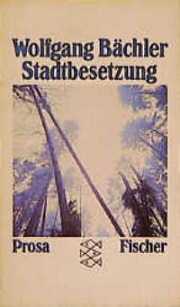
Wolfgang Bächler (22 maart 1925 – 24 mei 2007)
Cover
De Duitse dichteres en schrijfster Ilse Kleberger werd als Ilse Krahn geboren op 22 maart 1921 in Potsdam. Zie ook alle tags voor Ilse Kleberger op dit blog.
Frühling
Die Amsel singt
und dein Gummiball springt.
Die Sonne flirrt
und dein Springseil schwirrt.
Der Apfelbaum blüht
und dein Rollschuh zieht
eine schnurgerade Bahn.
Sommer
Weißt du, wie der Sommer riecht?
Nach Birnen und nach Nelken,
nach Äpfeln und Vergißmeinnicht,
die in der Sonne welken,
nach heißem Sand und kühler See
und nassen Badehosen,
nach Wasserball und Sonnenkrem,
nach Straßenstaub und Rosen.
Weißt du, wie der Sommer schmeckt?
Nach gelben Aprikosen
und Walderdbeeren, halb versteckt
zwischen Gras und Moosen,
nach Himbeereis, Vanilleeis
und Eis aus Schokolade,
nach Sauerklee vom Wiesenrand
und Brauselimonade.
Weißt du, wie der Sommer klingt?
Nach einer Flötenweise,
die durch die Mittagsstille dringt:
Ein Vogel zwitschert leise,
dumpf fällt ein Apfel in das Gras,
der Wind rauscht in den Bäumen.
Ein Kind lacht hell, dann schweigt es schnell
und möchte lieber träumen.
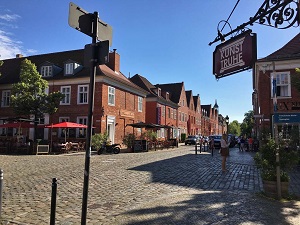
Ilse Kleberger (22 maart 1921 – 2 januari 2012)
Potsdam, Holländisches Viertel
De Franse dichter Léon Deubel werd geboren op 22 maart 1879 in Belfort. Zie ook alle tags voor Léon Deubel op dit blog.
INSTANTS DE FÊTE
Comme un enfant craintif j’erre à travers les rues.
L’ombre, ainsi qu’un automne, a flétri les visages,
Et des paupières d’or d’un azur sans nuages
Filtre le long regard des choses disparues.
En vain, je fuis la joie énervante qui rôde
Et propage en la nuit sa grossière hystérie.
C’est féte. La douleur des cuivres psalmodie…
Et l’Ivresse, en haillons, prophétique, clabaude.
Sur la place, où dormaient des silences de lune,
La crécelle d’un orgue a repris, une à une,
Les valses à la mode en robes de paillons.
Un clown, sur des tréteaux, parodie son martyre,
Et la foule, aux éclats de voix de l’histrion,
Acclame par instants la souffrance de rire.
NOTATIONS
Au travers de ton songe, entends sur cette rive
Les printemps persifleurs susciter les dryades
Et les sous-bois changeants, aidés des oréades,
Filer à leurs rouets l’argent des sources vives.
Par delà l’infini moutonnement des bois,
Entends, comme un rayon descendu d’une étoile,
Cette voix qui ondule au coeur de l’autrefois
Selon l’inflexion des collines natales.
C’est l’éveil frémissant d’un calme souvenir.
La courbe du passé fléchit vers l’avenir
Ainsi qu’un arc-en•ciel s’abaisse à l’horizon.
L’âme s’exalte au chant pastoral des villages
Et, simplement élit, pour sa fidèle image,
La sereine fumée au toit d’une maison.
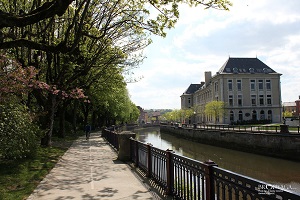
Léon Deubel (22 maart 1879 – 4 juni 1913)
Belfort
De Tsjechische schrijver Karel Poláček werd geboren op 22 maart 1892 in Rychnov nad Kně¸nou (Reichenau an der Knieschna). Zie ook alle tags voor Karel Poláček op dit blog.
Uit: We Were a Handful (Vertaald door Mark Corner)
“Joey Zilvar was there among them and I would have liked to ask him whether he’d really got married or what he was up to, but he kept mum, I expect because he didn’t want to say anything in front of the others. And the lads told me what was going on that was new. They said we had a new teacher who’s still hardly out of shorts and so they call him an ansillyary teacher, but on the other hand he knows how to run really fast and plays on the left wing for a sports club called Ctibor. Apparently in the last championship match he broke free and scored three goals, and one of them was taken on the volley. And they went on to say that when I was taken ill the entire place had to be whitewashed and there was no school for three days and so the whole affair had put a spring in the step of the pupils and they were really happy about it. I said to them: “I wonder if you’re properly grateful to me for all this.” They replied that everyone had said good things about me and called me a crackerjack because I’d been down with scarlet fever which was really something and I was ever so proud when I heard this. But the question of what happened to India kept preying on my mind and I just couldn’t get it out of my head. So I made up my mind to find out what I could from the lads. If they spilled the beans about it, all to the good, and if they didn’t say anything, so what. And so when they came to see me again, all of a sudden I blurted out in a loud voice: “India?” and then kept a crafty eye on them to see what would happen next. Speaking all at once the boys came back at me in another loud voice saying: “India!” Once again I fixed them with a cunning look and said in an even stronger voice: “Calcutta?” And back came the chorus in a strong voice of its own: “Calcutta!”
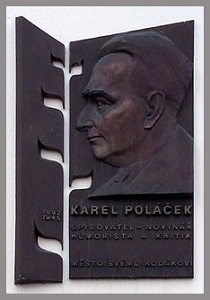
Karel Poláček (22 maart 1892 – 19 oktober 1944)
Gedenkplaat in Rychnov nad Kně, tegenwoordig Reichenau an der Knieschna
Zie voor nog meer schrijvers van de 22e maart ook mijn blog van 22 maart 2017 en ook mijn blog van 22 maart 2016 en mijn twee blogs van 22 maart 2014.

